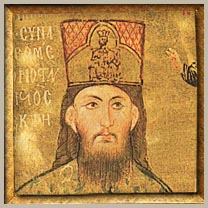Visit a 13th century Byantine palace and learn about Imperial life.

- A Scotman in Russia
- The First Steps
- Russian Military Flying Schools
- The Imperial All Russia Aero Club
- General Baron Kulbars & Aviation
- The Imperial Russian Technical Society
- The Prototype of the Zeppelin
- Contruction, Aviators & Workmen
- Famous Russian Flying Men
- I.I. Sikorsky
- Foriegn Aviators in Russia
- Heir Fokker's Russian Lady Pilot
- Just Before the War
- Aerial Russia & the British Press
- Aviation & the Russian Press
- By Way of Conclusion

Chapter XV - Aviation & the Russian Press
The Czar Alexander III, the creator of the modern Russian navy, was naturally and inevitably interested in the airship invented by Captain Kostovitch. It is evident that even at that early day the Russian monarch realised that the future of the navy and of aviation would be closely and intimately connected. This belief caused him to issue his historic order to his War Minister, J General Vannovsky, "to study the science of aviation, and after careful and elaborate examination to introduce this new branch of military art into the Russian army and navy. " General Vannovsky, in spite of his very limited general education, shared his master's conviction, and with his characteristic energy he at once set himself to the creation of Russian Military aviation. It will be clear to English readers that the circumstances prevailing in an autocracy are favourable for experiments with new ideas. The Czar having himself declared that aviation was an important subject demanding thorough and careful study, the good offices of the high authorities were at once assured and the interest of the whole people awakened. Without this approval of the sovereign, the history of aviation in Russia must have been very different. As a general rule unfamiliar innovations and new inventions are met in my country with great suspicion, particularly in bureaucratic circles. The aviation inventors never had to overcome this particular difficulty. On the contrary, from the beginning they were assumed encouragement and sympathy from the authorities, and in a short time aviation became the favourite child of the Russian nation and the Russian Government.

Until the day of his death the Czar Alexander III was keenly interested in the progress of the flying officers' school, and since his death the present Czar, Nicholas II, has ceaselessly striven to carry out the dream of his father. It may be news to the Western world that the Czar was himself largely responsible for the raising of the necessary capital for the creation of the powerful aerial flotilla which has played so great and splendid a part in the present war. Where the Czar leads the people follow, and the monarch's interest in aviation has stimulated public sympathy and has no doubt been one of the reasons why the Russian Press has steadily paid such helpful attention to the conquest of the air. Every Russian newspaper, every periodical, every weekly and monthly review have been for years eager to collect all the available information connected with the new science, and they have shown wonderful accuracy in the details they have printed of foreign aviation as well as of Russian aviation. It is particularly interesting to note that even the smallest Russian papers have refrained froro publishing frothy nonsense written by self-appointed experts. Before priming articles on aviation careful inquiries have been made into the technical credentials of the author, and editors have made a practice of asking whether he has himself had aviation experience, either on its scientific, technical, business, or sporting side. It has never been easy to be recognised by the Russian Press as an aviation expert and great care has been taken to allow no one to go outside his own particular sphere. Thus the sportsman has only been allowed to write on the sporting side of flying, the business man only on the business side, and the scientific man only on the scientific side. Each writer too must have his special qualifications and must be accepted as an authority by his own associates. In Russia a brewer who knows nothing about aviation is not accepted by the Press as an expert because he has had a dream about aeroplanes. He is allowed to advertise his beer in the advertising column, but he is not permitted to mislead the people by posing as an expert. The serious spirit in which the Russian Press has treated aviation has enabled the Russian public to have a real and valuable knowledge of one of the most important sections of modern science. Of course the Russian Press in the early days made many blunders, but they were the blunders inevitable to all men at the beginning and they were not mere arrogant inaccuracies of Ignorant boomsters.
The Russian newspaper censorshIp sometimes has beneficent results. The Government is always particularly careful about the educational matter put into the hands of the people and if a charlatan had persuaded any editor to publish a series of ignorant articles on aviation the publication would almost certainly have been forbidden to continue by the Director of Public Matter, acting either on his own initiative or after a protest from a recognised scientific society. One of the greatest pioneers of Russian aviation, Mr. Riaboushinsky, about whom I have already spoken in a previous chapter, regularly publishes the bulletin of the Kutchino Aero-Dynamic Institute. These bulletins are printed in French and are used as handbooks by both Russian and foreign constructors. Mr. Riaboushinsky is particularly interested in the problem of the air pressure on the surfaces of flying machines while they are flying in different positions. His distinguished collaborators include the celebrated, mathematician Professor Joukovsky. It is in my opinion singularly unfortunate that the freedom of the British Press has enabled humbugs, imbeciles, and fanatics often to pose in this country as aviation experts even in war time and thus to mislead the people. The British authorities have, through this abuse of freedom, been constantly placed in a position of difficulty unknown in Russia, where the accord between the Czar, the Government, and the people have made it possible for there to be a widespread accurate and practical knowledge of the science of aviation.
Russia, on the other hand, has grievously suffered from the lack of manufacturing facilities. She has been obliged to make most of her purchases abroad, and foreign aviadon constructors have been astounded by the thorough knowledge of their Russian customers. This knowledge has enabled Russia to lead the nations in the aviation of the future. As I have said over and over again, I regard the type of the Sikorsky giant planes as the most important aerial machines yet constructed and they have come into being as the result of their Inventor's own studies and of the ceaseless experiments and investigations of a whole body of Russian scientists. Although the Sikorsky aeroplane, as soon as it took the air, beat all the world records at the time, it speaks much for the seriousness with which. the Russian engineer regards aviation that Sikorsky and his works, the Russian Baltic Wagon Company, Ltd. declined to sell their first machine to the Russian War Office on the ground that it was not yet perfect and that they were about: to build a better one. This was the "Ilia Mourometz." The British public with its commercial instinct will be interested to know that the Russian Baltic Works spent a hundred thousand pounds in building and equipping the necessary shops for the construction of the giant aeroplane and another hundred thousand pounds in experimenting with them, and that they then declined to sell the plane to their country before they were convinced that it was as good as it could be. I admit that this sounds like a fairy story and that such conduct is the last thing to be expected from a commercial company. I quote the incident with considerable pride. It is possible that it could not have occurred anywhere else but in Russia, and I regard it as evidence of that staunch patriotism which will enable Russia to overcome all her difficulties and to attain that great position in the world which is hers by right. Self-sacrifice and hard work are the only bases on which national greatness can be built. I claim that these qualities are to be found in Russia. They exist supremely in Germany. Writing in all sincerity and as a friend of Great Britain l am forced to the opinion that until sacrifice and hard work become more popular among the British people the thorough crushing of Germany will still be eagerly awaited but will remain a dream.



